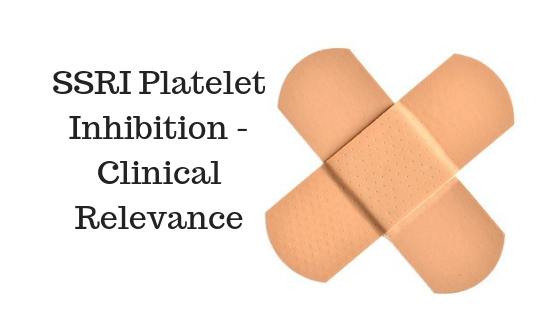I’ve covered many potential adverse effects and clinical quirks with the SSRI’s on this podcast, but one mystery still remains. What to do about the SSRI platelet inhibition effect? The SSRI platelet inhibition effect is a real clinical conundrum. If you remember physiology, you will remember that serotonin plays a role in the activation of platelets. The extent of platelet inhibition that SSRI’s can cause remains a puzzle. The clinical question is what if anything should we do about this in clinical practice. To be quite frank, I still struggle with this.
GI Protection?
In geriatrics, we often rail on the fact that the elderly are already taking too many medications. If we have a patient with depression and we start an SSRI, should we add another medication like an acid suppressing agent? I typically don’t recommend that, but it is an option.
When assessing the SSRI platelet inhibition effect, what I do look at is risk. I do that by considering a few questions. Does this patient have a risk of GI bleed? Do they already have anemia? Are they on other medications that increase the risk of bleed?
If the answer to any of the above questions is yes, I suspect that these patients will already be on acid suppressing therapy, but if they aren’t, adding the SSRI on top of their current risk factor(s) may warrant consideration of a PPI or H2 blocker.
Is it appropriate to use an SSRI in patient populations who are at higher risk of bleed? I think so, as I have certainly seen this done, but we may have to have a heightened awareness to check hemoglobin and monitor for signs of bruising or bleeding.
In the event a patient is on an NSAID, I would like to see that changed or discontinued if possible. Remember that NSAIDs have the potential to inhibit platelets.
If a patient is on an antiplatelet agent (aspirin, clopidogrel, etc.) or an anticoagulant (warfarin, DOAC, etc.), there is the potential that the SSRI may increase bleed risk further. An alternative antidepressant that doesn’t have serotonin activity is a consideration.
As this article points out, there is no randomized controlled trials on whether the SSRI’s increase the risk of bleeding, but we do have lots of retrospective data. Bottom line, there is a definite likelihood that an SSRI inhibits platelets. The extent of that inhibition and clinical impact is debatable. Clinical reasoning, monitoring, and common sense is probably the best we can do at this point.
Love the blog? Get a free gift simply for following! Over 5,000 medication loving healthcare professional have taken advantage of this!



Wonder if this conundrum may, in fact, be beneficial for a patient with Essential Thrombocytosis and refuses to take hydroxyurea due to s/e of severe headaches from hydroxyurea.